
OR
The real danger is when both India and China conclude Nepal is a burden
Published On: January 12, 2017 02:30 AM NPT By: Republica | @RepublicaNepal
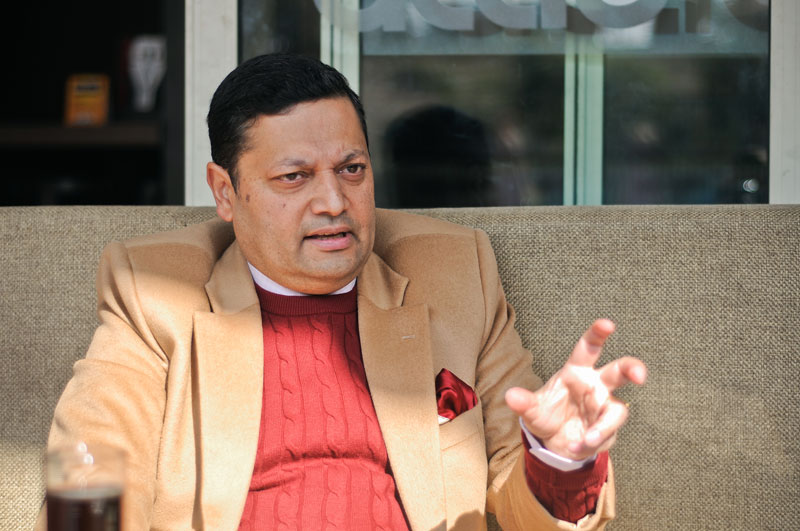
The Director of Center for South Asian Studies, Nischalnath Pandey, is a keen student of diplomacy in South Asia and of the strategic rivalry between India and China in Nepal. As Nepal and China prepare for a joint military drill, Biswas Baral and Mahabir Paudyal caught up with him on Wednesday afternoon to get his views on China’s perceived assertiveness in Nepal, on Nepal-India ties and on Nepal’s foreign policy priorities.
There have been many speculations regarding the joint military exercise between Nepal and China. India seems particularly concerned. How do you see these upcoming military drill?
Nepal Army already conducts such drills with Indian and American armies. So there is nothing unusual about the military exercise with China. Our military exercise with India is focused on anti-terrorism. There are many such problems and no country can deal with them all by itself. We need to join hands with like-minded partners on cross-cutting issues such as disaster management and counter-terrorism. This is the first time we are conducting military exercise with People’s Liberation Army of China. But China is already helping Nepal on various global and bilateral agendas and it is also helping Nepal Army and other security services here.
There is no reason why we cannot conduct military exercises with China because China’s focus, just like India’s, is also on countering terrorism. I would say this is a good initiative of Nepal Army. As for the suspicion raised in foreign media, they are suspicious whenever Nepal does something with China. The important thing is to ensure that we don’t impinge on sensitivities of our neighbors while conducting such exercises.
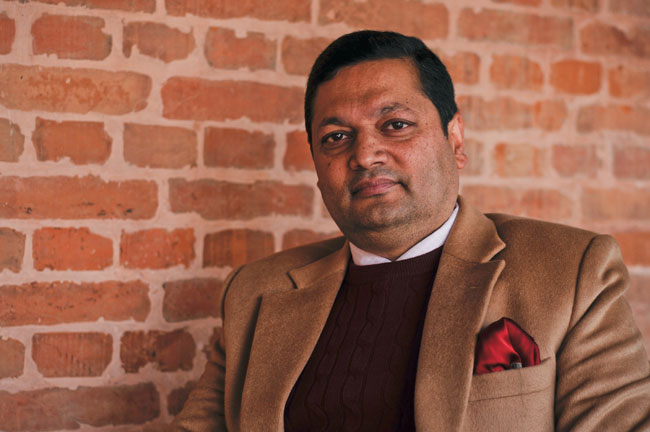
Will it be right to say that the Chinese have been more active in Nepal in the past year or so, particularly after the border blockade?
People say China has become proactive in Nepal after the blockade. I would say China has been active in Nepal ever since we established diplomatic relations with it in the 1950s. Along with its rise, China has been active throughout its neighborhood, in South East Asia, South Asia even in America, Europe and Africa. China is the largest trading partner of many countries around the world. It is the largest trading partner of several countries in South Asia as well. It already sends the largest number of tourists to the Maldives and Sri Lanka. It has direct road and rail connectivity with Pakistan and is now targeting the domestic market of India. India-China bilateral trade is already worth US$ 75 billion, and could soon hit the $100 billion mark. In Nepal, China is the second largest source of tourists. We are connected with air to more cities in China than in India. So China is reaching out to the rest of the world along with its rise. Nepal is no exception. You have to understand China’s proactive role in this context.
It’s also said that the blockade and India’s negative reaction to our constitution owed to the fact that Kathmandu was seen more sensitive to Chinese interests than it was to Indian interests.
Indo-China relation is subject to both competition and cooperation. While the two countries are cooperating in areas of climate change, trade and investment, and counter terrorism, they are also competing in a number of other areas. Smaller countries in South Asia like Nepal, Sri Lanka and Bangladesh are going to be the pockets where Indo-China competition will be increasingly felt. India-China rivalry will be reflected in the domestic politics of these countries. This is why these small countries have to make sure that they gain out of this strategic rivalry rather than fear it.
How much we gain will depend on our caliber and the activities of our political leaders. But in Nepal, we have taken our domestic political issues to the foreign policy domain and have dragged foreign policy issues into our internal politics. So we tend to politicize both domestic and foreign policy issues and blame foreign actors for domestic problems. This has become a habit of our political leaders. This is not done. It is not right to say that foreign actors are involved in every little issue of day to day governance. There is no point in blaming external actors for appointments and even removal of certain individuals from certain institutions. The political actors blame the external actors to hide their incompetence. They spread rumors against foreign actors. But they never reflect on how efficient they have been. This is a sad story.
But Indian intervention in Nepali politics is no more a matter of conjecture. It is an open secret.
There is a historical record of last Malla King of Kathmandu seeking the help of British East India Company to counter Gorkhali forces advancing towards Kathmandu. So it is hard to say where southern influence in Nepali politics begins and where it ends. We have sought the help of external force in internal problems a number of times. Fast forward to 1950, King Tribhuvan sought asylum in Delhi to unseat Rana regime. In the late 80s there was Indian blockade against the Panchayat system, which brought down the system. The 12-point pact that ended the decade-long insurgency also materialized in Delhi.
This trend will end only when Nepali political leaders start resolving their problems within the country and on their own. Only when they learn to resolve differences within the country will the foreign meddling stop.
But given that India has in recent times been ready to go to any extent to protect its interests in Nepal, how much can we blame our own actors?
There are two sides to it. First, our leaders go to Delhi to curry favors on their behalf. And when favors are not done, they become anti-Indian. So I sometimes think India is in a difficult situation. If they support certain political leaders in Nepal, they are criticized. If they don’t, they are also criticized.
Every new regime in Nepal comes into being owing to deterioration of India-Nepal relation. But the new regime also soon finds that it cannot accommodate Indian concerns. Honestly, this has been the tragedy of Indo-Nepal relation.
For its part, India needs to have larger heart while dealing with smaller neighbors. It should compete with the EU, the US and China, not with countries like Sri Lanka, Bangladesh and Nepal. It should take leadership of this region, much like Germany has done in Europe. We are small boats. India is the huge ship passing by. It needs to take us all along in its journey to prosperity.
Why do you think that the political parties that are fiercely pro-Indian today before long turn into big antagonists of India?
Like I said, this is the result of our tendency of inserting domestic political issue in Indo-Nepal relation. So every issue becomes politicized when India is concerned. Political leaders politicize Nepal-India relation because they have no development agenda for elections. They have not fought the election on the issues of economic and infrastructure development, connectivity and poverty alleviation. They have rather used controversies with India for electoral gains. And this is what results in uncomfortable relation with India.
Parties have failed to implement various good governance and infrastructure projects.
Take post-earthquake reconstruction. The EU had committed a total of 150 million Euros, with Germany alone pledging 30 million. There is huge amount of international aid in support of disaster management and post-quake reconstruction. Bur our pace of reconstruction is terribly slow. This has earned us a bad name abroad. Who is responsible for this? Do you blame the external actors? Reconstruction is the top priority for Nepal at the moment but we are making mockery of the whole process by replacing the chief of National Reconstruction Authority (NRA) every few months. Changing CEO rather than swift reconstruction seems to be the priority of Nepal.
The government could not declare public holiday today (Wednesday) on the occasion of Prithvi Jayanti even though civil society, social media users, Nepalis living abroad, political parties and even our President, Vice-president, Prime Minister and Home Minister have all recognized Shah’s contribution in Nepal’s unification. What stopped them from doing so? Do you blame external actors for this as well? This is the height of incompetence of our political leaders. They never look on how they have erred and how they are failing this nation.
What in your view does India want to see in Nepal right now?
India has made its stand on Nepal’s constitutional matters clear. When Prime Minister Narendra Modi came to Nepal for the first time, he asked political leaders to make the statute with rishi man (“heart of a sage”). He meant that the constitution will last when it is accommodative, inclusive and forward looking. India had sent a second message to Nepal through the statement of Indian External Affairs Minister in parliament. She had said that certain political leaders from Nepal had promised India certain things, and that these leaders had to keep their promises when drafting the constitution. We did not take her seriously. The leaders whose names were mentioned did not even bother to offer a clarification. Now when the amendment bill was registered in the parliament, India welcomed it. But we struggled for days to table it. And we are now debating whether to pass it or not.
It is said India has such and such stands on province demarcation. But what is our plan in terms of resource mobilization in federal Nepal? Experts have warned that budgetary issues could be big stumbling blocks to implementing federalism. Have we done any homework in this regard? How will we manage resources and budget to create the infrastructures for federal states? Nepal does not even have its own parliamentary building. The parliament secretariat is housed in a rented house built by the Chinese. How will we make seven assemblies in federal set up? There has been no debate on resource mobilization, taxation and budgetary issues in the federal setup. What we are debating is what India or China will say. We conveniently blame external actors for our internal weakness. Our leaders deflect their weakness on to external actors. But the moment they need to curry favor from India, they suddenly become pro-India. This has become a national disease.
But hasn’t Nepal become a playground for the broader strategic competition between India and China?
You have to look at India-China cooperation and competitiveness in South Asia as a big chess game. In this big game countries like Nepal are small pawns. Pawns can be taken only forward, not backward. Again a pawn can also be sacrificed for the larger pieces in the game. If you have to take your enemy’s Bishop or Rook, you will sacrifice the pawn. In a way a pawn is irrelevant in chess game. But the pawn, again, can only go forward.
India and China are both going to be political, military and economic and nuclear super powers of the 21st century. Fortunately Nepal is between them. So we have to capitalize on this strategic importance and reap benefits from their prosperity. Our priority should be how to benefit from cross-border connectivity, trade, transit and investment. If we fail to do that and political instability continues far into the future, there is a real danger that India and China will come to a conclusion that Nepal is not going to stabilize and start looking at Nepal as a burden, rather than an advantage. That will be the real tragedy for the country.
Nepal seems to have expended its energy focusing on how to balance India and China in the recent times. Where do you see Nepali diplomacy vis-à-vis the Western countries?
The fallout of long political instability has been seen in our relations with Western countries as well. There was a time when Queen Elizabeth visited Nepal twice; US vice president, German Chancellor, French president and Russian president all came to Nepal because we had political stability and we were outward-looking. Now we have become inward-looking. Domestic policy has taken front stage and foreign policy has taken a backseat. There have been no high-level visits from Western countries in recent times. We need to give more emphasis to our foreign policy, especially in this unpredictable world of Donald Trump. Nepal has failed to reach out to the Western world. Political instability is the reason for this. A paradigm shift is required to bring our foreign policy back on track.
In the end, can you enlist what should be Nepal’s foreign policy priorities right now?
We need to begin by playing an effective role as the chairman of SAARC. The SAARC Secretariat is in Nepal and the Secretary General is also a Nepali. But we have not been able to play an effective role as SAARC head. The entire South Asia expects this role from Nepal. Nepal should start from here.
You May Like This
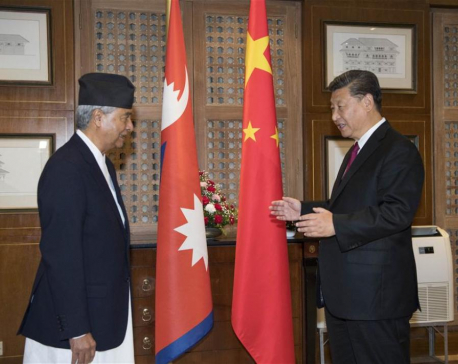
What is Nepali Congress thinking about China?
Some leaders are accusing China of land grab without verified and substantiated proof, while Nepali Congress leadership is pretending ignorance.... Read More...
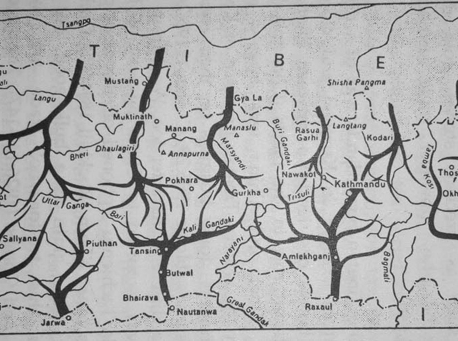
Where we failed on trade
Major trade routes Nepal struggles to open with China today were customary trade routes to travel and supply goods to Tibet... Read More...
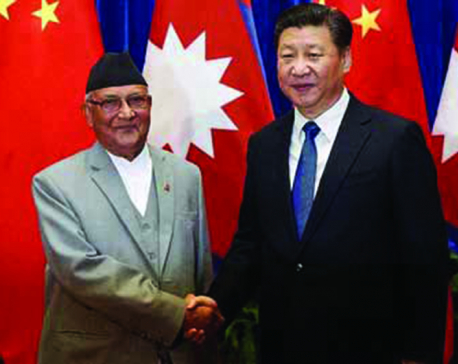
China takes the high ground in Nepal
Upcoming China-Nepal joint military exercises underline burgeoning bilateral relations that have eroded India's influence in the Himalayan republic ... Read More...







Just In
- NRB to provide collateral-free loans to foreign employment seekers
- NEB to publish Grade 12 results next week
- Body handover begins; Relatives remain dissatisfied with insurance, compensation amount
- NC defers its plan to join Koshi govt
- NRB to review microfinance loan interest rate
- 134 dead in floods and landslides since onset of monsoon this year
- Mahakali Irrigation Project sees only 22 percent physical progress in 18 years
- Singapore now holds world's most powerful passport; Nepal stays at 98th











Leave A Comment